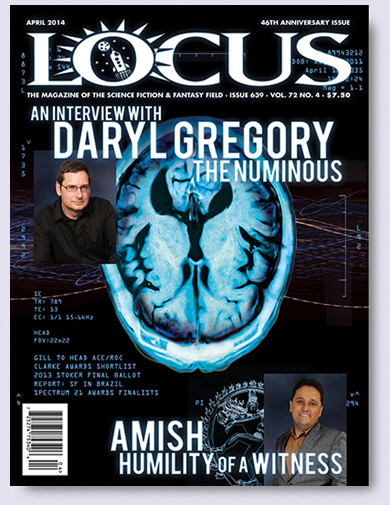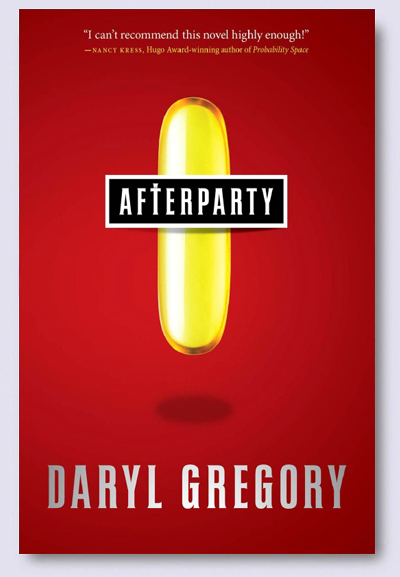 Not only has Kirkus been raving about Daryl Gregory’s latest novel, AFTERPARTY, but the novel has been attracting keen attention and interest elsewhere.
Not only has Kirkus been raving about Daryl Gregory’s latest novel, AFTERPARTY, but the novel has been attracting keen attention and interest elsewhere.
We’re very happy to report that Locus Magazine has put Daryl Gregory on the cover of its April 2014 issue! In his cover story, Gregory takes an in-depth look at his novels, in a chronological approach. He describing the impetuses and influences behind THE DEVIL’S ALPHABET, PANDEMONIUM, and RAISING STONY MAYHALL, and also explains how his work in comics has influenced the way he approaches his fiction-writing. Gregory then moves on to his latest science fiction thriller, which is published this month by Tor Books in the US. The novel is due to be published by Titan Books in the UK, in August 2014. The article is, of course, really interesting for many reasons. We thought we’d share a couple of snippets from those passages in which Gregory talked about his new novel…
‘The new book, AFTERPARTY, is about neuroscience and the feeling of the numinous. This is something I’ve toyed around with at various points. There’s a story called “Damascus” where I deal with this, and in every single thing I’ve written there’s this religious flavor that comes from being raised as a Southern Baptist. It just comes like grits in the South: there’s gonna be Jesus imagery in everything I write. AFTERPARTY has ideas I’ve been working on in science fiction short stories that never made it explicitly into a novel before (though weird stuff about identity keeps showing up even in the ostensibly fantasy novels, because that’s what keeps bothering me).’
On his intentions for the novel…
‘I wanted to write a book with velocity. I’ve always read a lot of crime novels, so I wanted to do an Elmore Leonard/Philip K. Dick/Hunter S. Thompson book. That was the original pitch, actually. The crime novel is at odds with the science fiction novel, in that in crime novels you don’t have to explain money or jealousy (the engines that drive almost everything in those stories). Of course you want more money! But with a science fiction novel, you’ve got people pursuing these goals you’ve got to stop to explain. It was kind of a formal trick to figure out how to get the neuroscience in there but still keep the velocity… AFTERPARTY is a mystery that has more of a classic science fiction ending, in that it opens up – things are about to get really weird. I’ve always liked it when science fiction novels kick open that door at the end.’
And the real-world influences on the near-future setting he chose…
‘I knew AFTERPARTY was going to be near-future, but it’s something like ten minutes into the future, with many small tech changes that are almost here. A lot of these ideas came from my day job as a programmer. One of my favorites is a little side thing where a bunch of people are playing a Dungeons & Dragons-style Live Action RPG on their handhelds. This seems like an eminently doable thing, but it’s not quite there.’
 Once again, AFTERPARTY is published by Tor Books in the US, and is due to be published by Titan Books in the UK in August 2014.
Once again, AFTERPARTY is published by Tor Books in the US, and is due to be published by Titan Books in the UK in August 2014.
There was even more love for the novel in the April issue of Locus, in fact, with not one but two reviews!
Faren Miller had the following to say: ‘Daryl Gregory began to delve into the collective unconsciousness with his Crawford Award-winning first novel PANDEMONIUM, and he continues to find bold new ways to enter that zone… it’s clear that Daryl Gregory continues to be one of the top writers in a field where literature works alongside adventure – and both forms benefit from the exchange.’
Russell Letson, who was particularly taken with the genetically-engineered miniature bison in the novel (we kid you not), also wrote the following: ‘[AFTERPARTY] is a chase-thriller, a noir mystery, and an international road-trip adventure, with a cast that is mostly crazy, criminal, or both… The intellectual side of the trip recalls Greg Egan’s ‘‘Mister Volition’’ or ‘‘Chaff’’: an adventure in neurochemistry and mental plasticity that invites us to consider just how crazy we can be and still retain a humanity that is recognizable, decent, and functional… philosophical and moral questions are implicit in the novel, but one could be forgiven for putting them to one side while going along for the story’s twisty, gritty ride… This is a real science-fiction crime thriller: the old evils and insanities are all there, given new twists by the double-edged blades of science and technology. And, like the best crime and SF novels, those moral and philosophical questions linger, after the mere whodunnit puzzles have been solved.’
Zeno represents Daryl Gregory in the UK and Commonwealth, on behalf of the Martha Millard Literary Agency in New York.
